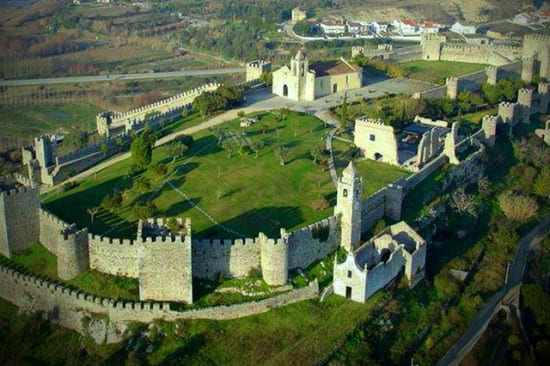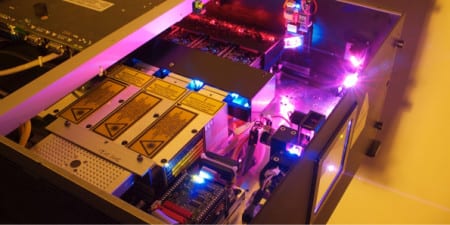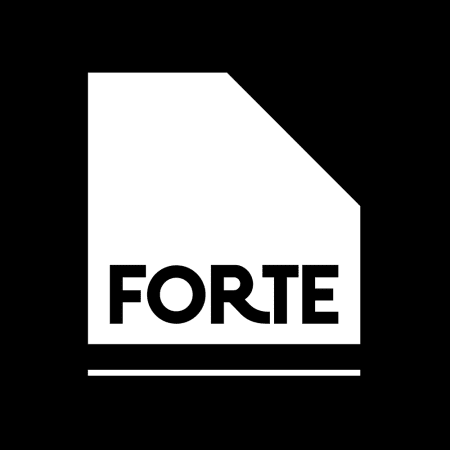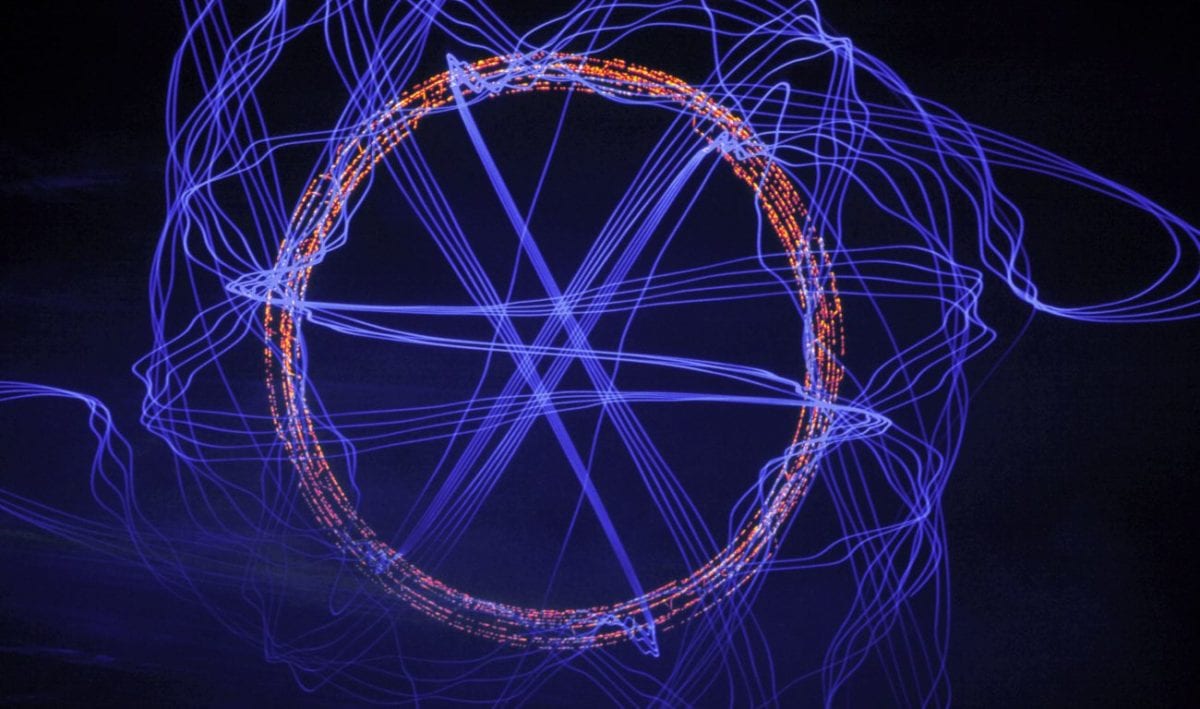
Sitting top of Festival Forte’s billing is ‘Lumière II‘, the audio visual extravaganza from Robert Henke. If you consider that electronic music as a performance art is still in its infancy, it is no surprise to find Henke at the forefront, looking to stride through the uncharted as others GPS navigate through well established routes. Knowing Robert as the force behind Monolake, you will appreciate his endeavours sonically, however it is his role in the design of Ableton that has an impact far beyond that, no matter what your musical allegiance lies.
The subtle grey and black tones of the Digital Audio Workstation (DAW) has now become an electronic music industry standard, as much as the Technics 1200 was for DJing. It’s flexibility in approach moulded around the user, whether they painstakingly arrange mixes or splice up stems and MIDI loops on the fly as part of a live performance. This platform has allowed Robert to get truly creative, not only providing the structure to be able to perform live but utilise its programming elements to drive the visual side of the ‘Lumière II‘ installation.
With ‘live’ increasingly translating as ‘banks of analogue and modular equipment’, ‘Lumière II‘ serves as a timely reminder that Ableton is not a shortcut DJing platform and one of template music production, but a landmark in performance software that has brought producers out of the dark, into the forefront and pushing boundaries further than ever before.
With the Festival Forte looming round the corner, we took the chance to catch up with Robert to talk about the project and his involvement with the festival.
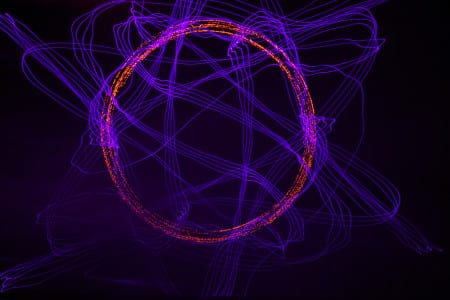
"Composing for Lumière means composing both in the auditive and visual domain."
How did you end up working with Festival Forte on this project and was the lecture something that was considered from the off?
Festival Forte’s director Ilido Chaves brought me to Portugal for a Monolake show several years ago, and he was very keen on having Lumière at the festival.
Since it is an outdoor situation, which is very different from the usual setup for Lumière it was necessary to have a site visit. I thought once I am there it cannot hurt to do a lecture, too. I have a background in teaching and I enjoy providing insight into the artistic and technical side of my works.
There is a fine heritage in Portugal thanks the likes of the Underground Sound Of Lisbon and their Kismet imprint. Did you get the feeling that there was a thirst for electronic music and cutting edge technology in the local scene out yourself?
Unfortunately my schedule is always so tight that I rarely find the time to dive deeper in local scenes whilst traveling. But judging from experiences of performing in Portugal there is quite some interest and a lot of enthusiasm.
"What I do with the lasers cannot be done with any commercial laser control software."
The lecture you gave was not a first for you. How did you get into lecturing and does it carry a different sort of pressure than a live performance?
I got into it simply because a friend of mine was teaching at the Berlin University of Arts and they needed a new professor for sound design and he was convinced I would be a good match. And, it seemed I did a good job, a lot of people were quite sad when I decided to stop teaching four years later.
Teaching a class for several semesters is very different from doing a lecture. A lecture is more similar to a concert. I arrive, do my show, and that’s it. But a class requires a very deep and intensive exchange with students. That’s closer to actually playing with them in a band. There is a lot of flow of information and inspiration from all sides. Teaching implies learning, too. I learn a lot from my students all the time.
"A class requires a very deep and intensive exchange with students. That’s closer to actually playing with them in a band."
What sort of planning goes into making something like Lumiere II? Obviously there is the musical composition element but the technical aspect must be quite intricate.
What I do with the lasers cannot be done with any commercial laser control software. I had to write my own tools for it, and that took quite a lot of thinking and time. I have been working on this project since 2013.
Currently I am in the happy position that the software is in such a state that I can actually use it, and be creative with it, instead of spending my time coding. I use it as it were a piece of software I bought, and ignore the fact that I could add features by myself.
It is important to separate coding and working with the tools. Now I really look into the results, from a purely artistic perspective. Every few shows I make a slight update of Lumière, as a result of my experience when performing it with an audience. That’s always different from the rehearsals.
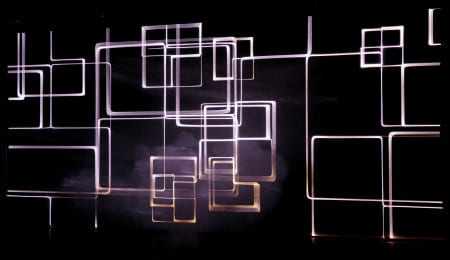
"I liked the challenge to explore a medium that is usually connected to really cheesy graphic displays, green tunnels at raves, and rotating company logos on buildings."
Considering that you will be projecting directly onto the fort, was the location a major factor in the preparation?
We project onto a screen mainly. However, the screen is quite small, and if time permits I will try to extend the projection to include parts of the fort. But at the moment it is not clear how far this will go.
Lumière II is now your third project involving a spectacular light show. What sort of lessons have you learnt as you have stepped from project to project? And what suddenly kicked off the desire to run with lasers?
I liked the challenge to explore a medium that is usually connected to really cheesy graphic displays, green tunnels at raves and rotating company logos on buildings.
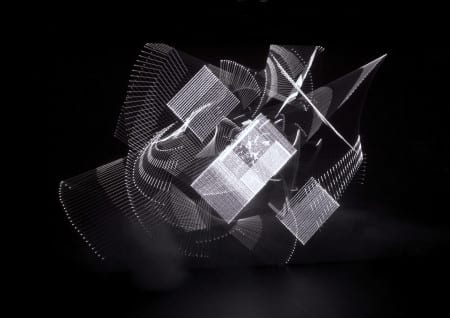
"I want to avoid a show that becomes some sort of demonstration of possibilities."
I was convinced that with my technical background and my artistic ideas I could come up with different results, and I think I succeeded with this. I have plans to do a lot more new projects involving lasers.
When composing, do ever have to make any concessions musically? Thinking, “I can’t do this sort of movement because it would cause complications in the lightshow”?
Absolutely. Composing for Lumière means composing both in the auditive and visual domain. Bigger conflicts happen with the large scale.
I have a lot of material, but I want to avoid a show that becomes some sort of demonstration of possibilities. I’d rather try to tell some sort of narrative and leave patterns and shapes out which would conflict with the overall shape of the performance.
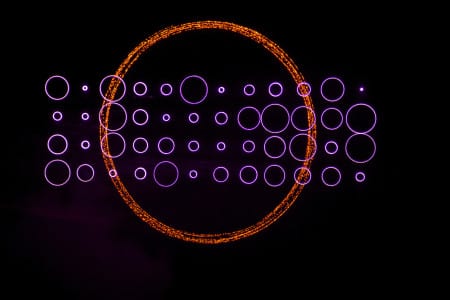
"I'd rather try to tell some sort of narrative and leave patterns and shapes out which would conflict with the overall shape of the performance."
Instead of a regular album release, is audiovisual where you see your artistic direction lying now?
It is not a decision for one or the other. I am actually releasing new Monolake tracks quite constantly. It just happens on a small scale on a limited 12″ vinyl run.
Later on there will be an album with the same or similar material and then I am going to make a bit more fuzz about it.
The musical side is not dead at all. However, my goal is to do more and more complex audio-visuals works in the future, both concerts and installations.
The other major association you have is with Ableton. What has it been like to see it being adopted as the defacto industry standard electronic music software? Does life before Ableton seem like a distant memory?
Time passes by quickly. Ableton was founded in 1999, that’s more than 15 years ago. I remember very clearly the development of the Operator, which kept me busy in 2003, but that feels like a different time from now. I am still fascinated when I see people using Live. I need to hold back when my seat neighbour in the plane opens her laptop and makes music with Live. And doing things musically I would never do with it.
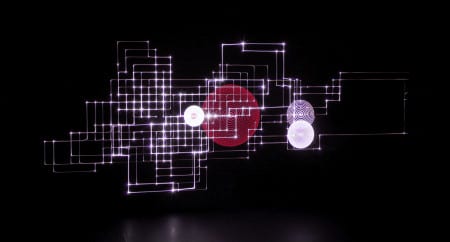
"I like to experience something that I do not expect or have not seen or heard before. I want to be surprised."
For my part, Ableton really hit the radar when Sasha publically endorsed it around version 5 – through his Fundacion mix and showcase on the Essential Mix. Did you suddenly see a huge spike in interest for the software?
The initial spike did happen, but much earlier. In fact on the second day of the first presentation at NAMM in 2001.
On the first day no one really showed up at the booth of that new software company. However on the second day, some grey haired guy followed by ten young people in black t-shirts showed up and I explained him how he can change the tempo of an audio loop whilst it is running from 60 BPM to 999 BPM. He was quite impressed.
After he left it took two hours and suddenly a lot of people showed up: “Hans Zimmmer told us you have an interesting product here, can you tell me more?“. From that moment onwards, Ableton Live started to grow.
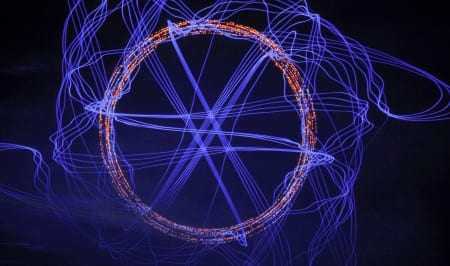
"Modulars cannot create a 64-voice cluster with perfect tuning that slowly merges into a single note. Computers can."
You’re obviously heavily embedded in the digital / laptop world through Ableton; however there has been a huge surge in popularity for classic hardware synths, which has in turn spawned a new generation of hardware synths. – Is moving away from digital, the crazy flexibility of MAX, into working with a bank of synths something that appeals to you as a tech head, or does digital offer a far bigger world for you to step away from?
Unless I have to decide whether I have to take my laptop with Live with me on the island, or some of my old hardware machines or a modular system I would say: I want it all. The combination is what makes most sense.
The computer is great for editing and doing complex digital processing, but it is also great in providing a stable clock for triggering a modular system to get lost in without staring at a screen.
I love my old machines and I just start exploring the joy of a modular system but every instrument has its strength and limits. Modulars cannot create a 64-voice cluster with perfect tuning that slowly merges into a single note. Computers can.
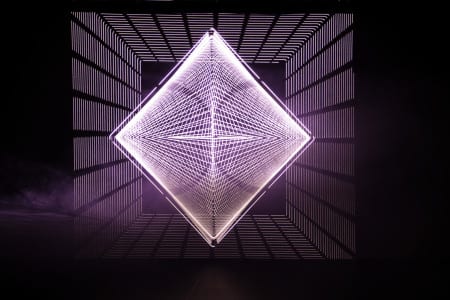
"When I am at festival I try to experience as many other acts as possible, afterwards I have an opinion. Before that I am just curious."
Looking back at Festival Forte; you’re a huge attraction and all eyes will be on Lumière II, but is there anyone you’re itching to see from the rest of the line-up yourself?
I like to experience something that I do not expect or have not seen or heard before. I want to be surprised. Who ever does this to me will have my full attention, no matter if I know the act already or not? When I am at festival I try to experience as many other acts as possible, afterwards I have an opinion. Before that I am just curious.
FESTIVAL FORTE LINEUP
27 – 29 AUGUST 2015
Acronym / Adam X / Adriana Lopez / Afonso Macedo / Amulador / Apart / Ben Klock / Developer / Donato Dozzy / Duodub / Ellen Allien / Expander / Extrawelt / Front 242 / Function / Gaiser / Headless Horseman / Manu / Marc Houle / Marcel Dettmann / Marcel Fengler / Nx1 / Paul Kalkbrenner / Planetary Assault Systems / Regis / Robert Henke / Rui Vargas / Subjected / Vatican Shadow / Xnx
BUY TICKETS / FESTIVAL FORTE WEBSITE
